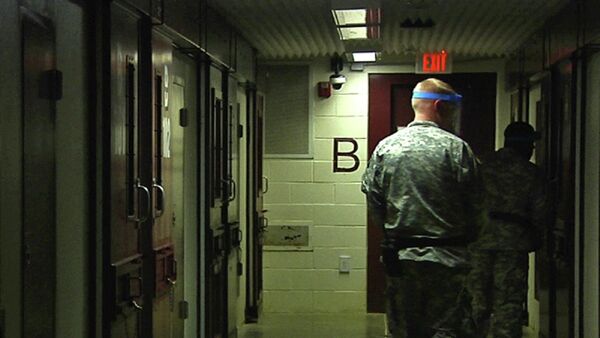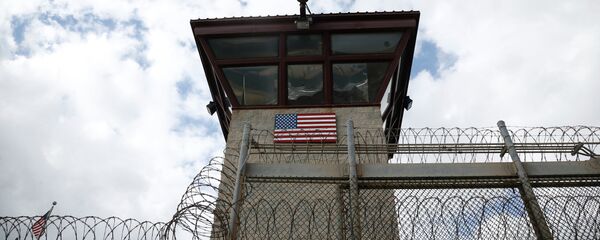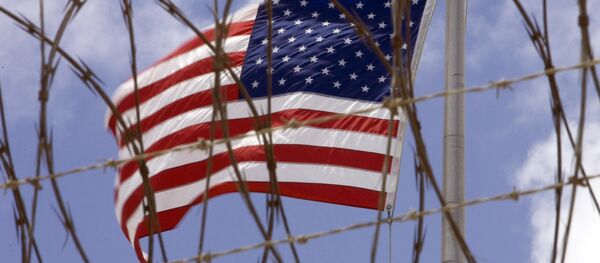Abu Zabaydah, a detainee in Guantanamo prison for the last 14 years, has now been given an opportunity to stand up to a commission of representatives of six US intelligence services, and argue why he should be released. This is as close to justice as he will get, says John Kiriakou, CIA analyst-turned-whistleblower who holds the dubious distinction of being the only man who's been sent to prison in connection with the US torture program, which he had a hand in exposing.
Zabaydah was captured in Eastern Pakistan in early 2002, in the wake of 9/11 attacks. As Kiriakou told Sputnik, he led the raids to capture Zabaydah, believed to be the number-three person in al-Qaeda, having direct access to Osama bin Laden and direct knowledge of the 9/11 attack.
The arrest was a grave mistake. Zabaydah turned out to be a minor figure in al-Qaeda's schemes, and not even a member of the terrorist organization, simply hosting a safe house in the 1990s. This admission was the sum total of revelations acquired by the CIA regarding Zabaydah, after years of torture and solitary confinement in Guantanamo.
"The CIA experimented with all these different techniques: waterboarding, sleep deprivation, confining him in a dog cage and a whole number of different things," Kiriakou told Loud & Clear's Brian Becker. "But in the intervening years, information has come to light that Abu Zabaydah was never the person that the CIA said he was, and the Bush White House said he was."
"And then President Bush responded to a reporter's question one day, saying, very bluntly, ‘the US does not torture,' he said, ‘if there is torture, it's the result of the rogue CIA officer.' And I knew that was a lie," Kiriakou said. And I thought, "They're going to try to pin this on me."
Kiriakou's next move was to appear on Brian Ross's ABC News show, exposing what we now know as the Guantanamo torture program.
"The CIA found itself down the rabbit hole after Sept 11th," Kiriakou told Sputnik. "They hired two — in my view — very sick, ‘contract psychologists,' who came up with this torture program by reverse engineering the Military's ‘fear program.'"
Kiriakou's revelations caused the FBI to launch an investigation against him. The federal agency spent almost a year trying to come up with something, eventually deciding that Kiriakou had committed no crime. After President George W. Bush stepped down from office, President Barack Obama was inaugurated, and it was Obama's order, just weeks after the inauguration, to reopen the case against Kiriakou. Remarkably, Kiriakou was not informed that the case had been reopened.
Four years later, Kiriakou left Capitol Hill, where he had been a senior investigator on the Senate Foreign Relations Committee, only to be arrested by the FBI. He spent some thirteen months in court and eventually received a reduced charge.
"It's an economic decision. You're facing a maximum of forty-five years in prison. The prosecutors are asking the judge for 18-24 years. But if you just change your plea to "guilty," they'll agree to two-and-a-half years. And you'll do less than two."
"Of course that's what you're going to do. It's the only way to save whatever scraps of your life you have left," Kiriakou said.
All the while, Abu Zabaydah was being tortured in Guantanamo by a depraved government seeking information the victim did not possess.
According to Kiriakou, Zabaydah was waterboarded some 84 times, in addition to the practice of consistent sleep deprivation and, most repulsively, being confined in a dog cage. Prison officials, backed by the US government, failed to get any valuable information or proof that Zabaydah had anything to do with the 9/11 attacks. Yet, he remains a captive in Guantanamo, and will never be released.
"The sick truth is, no matter what happens, he'll never be charged with a crime, because his defense would be that everything he says was the result of torture," Kiriakou explained. "And the US government can't defend a suit like that in court. Instead, what they do is just pretend the Constitution doesn't exist. They hope that Americans either don't care or stop caring, once they do. And that nobody will pay attention after a while."
"The CIA's written position as annunciated in the Senate Torture Report… [is] that he should remain ‘incommunicado' until he dies. That he should never have access to the outside world ever again for any reason," Kiriakou said.






